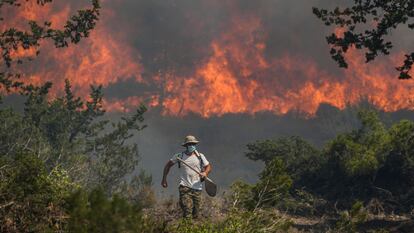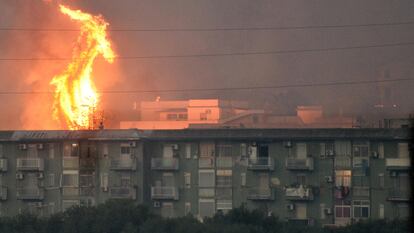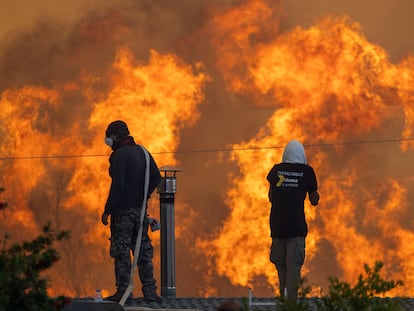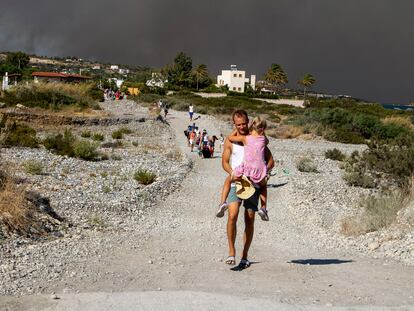The Mediterranean goes up in flames: Greece, Italy and Algeria continue to battle wildfires
A water-dropping plane crashed on the Greek island of Evia, killing both pilots. At least 34 people have died in Algeria in recent days, and five in Italy. Croatia and Portugal are fighting fresh fires
The scenes of tourists running from the flames or water-dropping planes crashing while trying to put out a fire seem like something out of a disaster movie. However, these are real scenes that are taking place in Mediterranean countries such as Greece, Italy and Algeria. Croatia and Portugal were also battling blazes on Wednesday.
Summer once again has become a nightmare in southern Europe and northern Africa due to numerous fires fed by high temperatures and tinder-dry conditions. In Algeria, at least 34 people have died as temperatures exceeded 45 degrees Celsius (113ºF). And in Italy, where five people are reported dead so far, fires forced the closure of Palermo airport in Sicily, which is being particularly hard hit by the flames.
In Portugal, hundreds of firefighters were on Wednesday trying to extinguish flames around the popular tourist destination of Cascais, but strong winds are fanning the flames and complicating the efforts. The fire started in a mountainous area of the Sintra-Cascais park, which covers some 56 square miles (145 square kilometers) west of Lisbon. Meanwhile, another forest fire was advancing in Dubrovnik, on the Croatian coast.
Meanwhile, in Greece, a CL-215 water-dropping aircraft with a crew of two crashed on the island of Evia, northeast of Athens, while it was helping put out one of several dozen wildfires. In footage released by the public broadcaster ERT, the aircraft is seen discharging the water on the flames, then turning to the right and dropping into a deep fold in the ground. An instant later, a fireball can be seen. Official sources have confirmed the death of the two pilots.
In Athens, authorities resumed afternoon closing hours at the ancient Acropolis, as part of broader measures to cope with the high heat.
The island of Rhodes is highly popular with Scandinavian tourists, who are expected to continue heading to the island this week despite the fires. Two full charter flights were scheduled to depart from Sweden on Wednesday, Swedish newspaper Aftonbladet said. Tour operators said holidaymakers would be heading to resorts in the so-far unaffected northern part of Rhodes.
The European Union has sent 500 firefighters, 100 vehicles and seven planes from 10 member states, while Turkey, Israel, Egypt and other countries have also sent help.

In Greece, the most complicated situations were on the islands of Rhodes and Corfu, both popular with tourists. In Rhodes, authorities on Tuesday evacuated the town of Vati and forced its residents to move to Lindos, on the coast. The Ministry of Climate Change has decided to evacuate the town of Lachania and the tourist area of Plimíri. Flames were also heading towards the town of Gennadi.
In Corfu, multiple fronts have been reactivated in the northeast of the island due to strong winds. The residents of Loutses, Himerolia and Sikia have been urged to evacuate and head for the port of Kassiopi. The mayor of North Corfu, Giorgos Mahimaris, told local media that “the situation is tragic, the fire is burning down homes.” Mahimaris underscored the difficulties in convincing some desperate residents who are trying to save their homes and livestock: “We are trying to convince the last residents to leave. Several of them saved their horses and sheep at the last moment.”

Evacuees in Italy
The high temperatures registered in the south of Italy and the strong storms in the north of the country made Tuesday “one of the most complicated days in recent decades,” according to the Italian Civil Protection Minister, Nello Musumeci. The official, who is part of an executive that questions the reality of climate change, made these statements after the devastating effects of a combination of heavy rains, hail and a heat wave.
The south of the country, especially Sicily, was hit by extremely high temperatures and fires that forced the closure of Palermo’s international airport, where the flames reached the vicinity of the facility. The flames also reached the archaeological park of Segesta, in the northwest of the island, about 6 miles (10 kilometers) from the coast and about 31 miles (50 kilometers) west of Palermo. By early Wednesday the fires had also affected the regions of Calabria and Apulia.
Deaths in Algeria
Across the Mediterranean, in Algeria, thermometers reached 48 degrees Celsius (118ºF) in the provinces of Annaba and Yiyel, which, together with tinder-dry conditions, have helped spread close to a hundred forest fires in 16 northern departments. The most deadly one is devastating the provinces of Bouira and Bukhia, in the Berber region of Kabylia, which has claimed the lives of at least 34 people, including 10 soldiers, according to the Algerian Ministry of the Interior. Thousands of people have had to be evacuated due to the advancing flames.
On Wednesday the situation could get worse for some of these Mediterranean countries. The Greek National Meteorological Service has warned of the arrival of a new heat wave — Greece is experiencing the longest succession of heat waves in its entire history — and the Fire Department has forecasts an “extreme” risk of fires in mainland Greece and “very high” in the rest of the country.
Sign up for our weekly newsletter to get more English-language news coverage from EL PAÍS USA Edition
Tu suscripción se está usando en otro dispositivo
¿Quieres añadir otro usuario a tu suscripción?
Si continúas leyendo en este dispositivo, no se podrá leer en el otro.
FlechaTu suscripción se está usando en otro dispositivo y solo puedes acceder a EL PAÍS desde un dispositivo a la vez.
Si quieres compartir tu cuenta, cambia tu suscripción a la modalidad Premium, así podrás añadir otro usuario. Cada uno accederá con su propia cuenta de email, lo que os permitirá personalizar vuestra experiencia en EL PAÍS.
¿Tienes una suscripción de empresa? Accede aquí para contratar más cuentas.
En el caso de no saber quién está usando tu cuenta, te recomendamos cambiar tu contraseña aquí.
Si decides continuar compartiendo tu cuenta, este mensaje se mostrará en tu dispositivo y en el de la otra persona que está usando tu cuenta de forma indefinida, afectando a tu experiencia de lectura. Puedes consultar aquí los términos y condiciones de la suscripción digital.
More information
Últimas noticias
Chris Martin, Taylor Swift, Elijah Wood and other famous wedding ‘crashers’
‘How does it feel to be a failure?’: Elizabeth Berkley’s journey from ‘Showgirls’ ridicule to vindication
The story of the Málaga virus: The code that haunted Google’s cybersecurity center director for 30 years
The impact of Ecuador’s mega-prison: A polluted river, cleared forests and military checkpoints
Most viewed
- The low-cost creative revolution: How technology is making art accessible to everyone
- Christian Louboutin: ‘Young people don’t want to be like their parents. And if their parents wear sneakers, they’re going to look for something else’
- All the effects of gentrification in one corner of Mexico’s Colonia Roma
- Liset Menéndez de la Prida, neuroscientist: ‘It’s not normal to constantly seek pleasure; it’s important to be bored, to be calm’
- December Social Security and SSI payments: Dates, double checks and the 2026 COLA increase











































